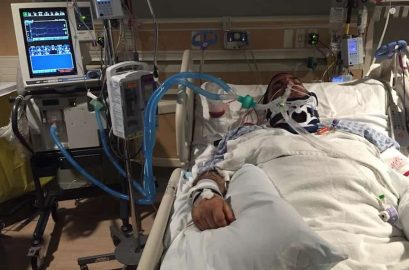Know Your Rights: Surviving a Traumatic Brain Injury After an Accident
Last updated Tuesday, July 25th, 2023

Traumatic Brain Injury (TBI) can be life-altering or fatal, but Sam did not let that get the best of her. According to Brainline.org, in 2014 Sam was involved in a serious car accident days before her 16th birthday. The first responders on the scene had to bend and twist her body out of the car. Sam went through multiple life-saving surgeries and experienced many setbacks in her recovery. She survived, but years later still suffers from TBI that has affected her vision and recurring headaches. When a person experiences a head injury, the detection of TBI is not always immediately evident.
Darryl Isaacs, personal injury attorney and TBI survivor can personally relate to Sam’s story. Darryl’s road to recovery has been long and difficult one after being hit by a car while riding a bicycle. The accident left him with a scalp injury, broken neck and two injured shoulders resulting in a month-long hospital stay and multiple surgeries. Darryl spent a lot of time slipping in and out of consciousness.
“Anybody with a TBI needs an attorney, it’s a very complex area of the law. With a TBI, you are potentially facing a lifetime of medical bills and may be in need of a Life Care Plan.” – Attorney & TBI Survivor, Darryl Isaacs
What is a Traumatic Brain Injury?
Not all injuries to the head result in traumatic brain injury. According to the American Association of Neurological Surgeons, a traumatic brain injury (TBI) is defined as a blow to the head or a penetrating head injury that disrupts the normal function of the brain. TBI can extend from mild cases such as a change in mental state or consciousness to more severe like extended periods of unconsciousness, coma, or death.
The U.S. statistics on TBI cases and costs are astounding. Motor vehicle accidents, falls, and sports injuries are the leading causes of TBI. About 1.7 million cases of TBI occur in the US every year and 5.3 million Americans live with a TBI related disability, costing an estimated $48 – $56 billion annually.
Approximately 50,000 deaths are related to TBI of which half of those deaths happen in the first two hours of the brain injury. Annually 80,000-90,000 people experience the onset of long-term or lifelong disabilities of TBI. There are about 235,000 hospitalizations for TBI every year, 78.8 percent male, 21.2 percent. National Statistics estimate between 50-70 percent of TBI accidents are caused by motor vehicle crashes and 21 percent of TBI incidents among children and adolescents are from sports and recreational activities.
According to the CDC, in 2013, TBI related death rates were the highest for people 75 years or older. Among non-fatal TBI injuries in 2013, hospitalization was the highest among people 75 years and older. Falls were the leading cause of TBI related emergency room visits and hospitalizations between the ages of 0-14 and 45 years of age and older. Motor Vehicle crashes were the leading cause of hospitalization for adolescents and persons 15-44 years of age.
Signs and Symptoms of a Traumatic Brain Injury
Brain injury can occur when something strikes your head, or if your head moves violently and suddenly like a whiplash injury, or if your head hits something, like hitting the steering wheel in a car wreck, or the floor in a fall. TBI can be a result of many different brain-related injuries. There are several symptoms to look for in order for a proper diagnosis to be in place.
Sometimes concussion or brain injury symptoms tend to sneak up on you and not always immediately present. TBI has a lot of common symptoms that should be monitored if you feel these symptoms regularly occurring. Symptoms will vary depending on the individual and severity of the head injury. Please do not diagnose yourself, if you feel like you might be suffering from TBI please call your medical physician or go to the nearest ER.
TBI symptoms can include:
• Vomiting
• Lethargy
• Headaches
• Confusion
• Paralysis, Numbness or Tingling
• Loss of Consciousness
• Coma
• Dilated Pupils
• Vision Changes
• Dizziness
• Balance Problems
• Breathing Issues
• Slow Pulse
• Ringing in the Ears or Changes in Hearing
• Irritability or Improper Emotional Responses
• Speech Difficulties
• Difficulty in Swallowing
• Drooping Eyelids or Facial Weakness
• Loss of Bowel or Bladder Control
Traumatic Brain Injury Medical Evaluation
If there is suspicion of a traumatic brain injury, your medical professional will conduct a systematic evaluation. The cardiac and pulmonary functions need to be assessed first, followed by an examination of the entire body and a complete neurological evaluation. The first part of the examination is an assessment using the Glasgow Coma Scale (GCS) and the patient’s reactivity to light. If the patient is suffering from a large mass lesions or high intracranial pressure (ICP), one or both pupils may look dilated. The gold standard for the radiological assessment of a TBI patient is CT scan or CAT scan, which will identify the presence of blood and fractures. Mild neurological dysfunction can be identified with an x-ray of the skull. In stable TBI patients, MRI can even be more effective in detecting lesions than CT scan.
Brain Injury Medical Treatments and Rehabilitation Can Be Lengthy and Expensive
At this present time there is no medication or “miracle treatment” that can be given to prevent nerve damage or promote healing. Depending on the type of brain injury, recovery could take weeks, months or years. Most hematoma related injuries may require surgery and lengthy hospital stays. Physical recovery related to the injured tissue is typically faster than cognitive recovery. Some victims must relearn basic skills or learn to adapt to new skills to compensate for permanent damage. Rehabilitation is an important part of traumatic brain injury treatment and recovery. These services may include occupational therapy, physical therapy, speech therapy and cognitive therapy.
Why a Brain Injury Patient Needs a Personal Injury Law Firm
TBI has affected many families around the world, especially in the United States. Brain injury diagnosis, treatment and recovery are complex. TBI often leads to financial stress due to lost wages, time off of work, future earnings, medical bills and living expenses. An experienced personal injury law firm can ensure your rights are being protected and assist you with navigating the complicated legal, medical, and financial obstacles.
In many cases, a severe brain injury patient requires a Life Care Plan. According to Lcius.com, “The Life Care plan is a dynamic document based upon published standards of practice, comprehensive assessment, data analysis and research, which provides an organized, concise plan for current and future needs with associated cost for individuals who have experienced catastrophic injury or have chronic health care needs.”
Isaacs & Isaacs Personal Injury Law Firm is dedicated to protecting you from another’s wrongful act or lack of care for the safety and health of others. Our lawyers in Kentucky, Indiana and Ohio have 346 collective years of legal experience.
Call (800) 333-9999 for a free case review.











